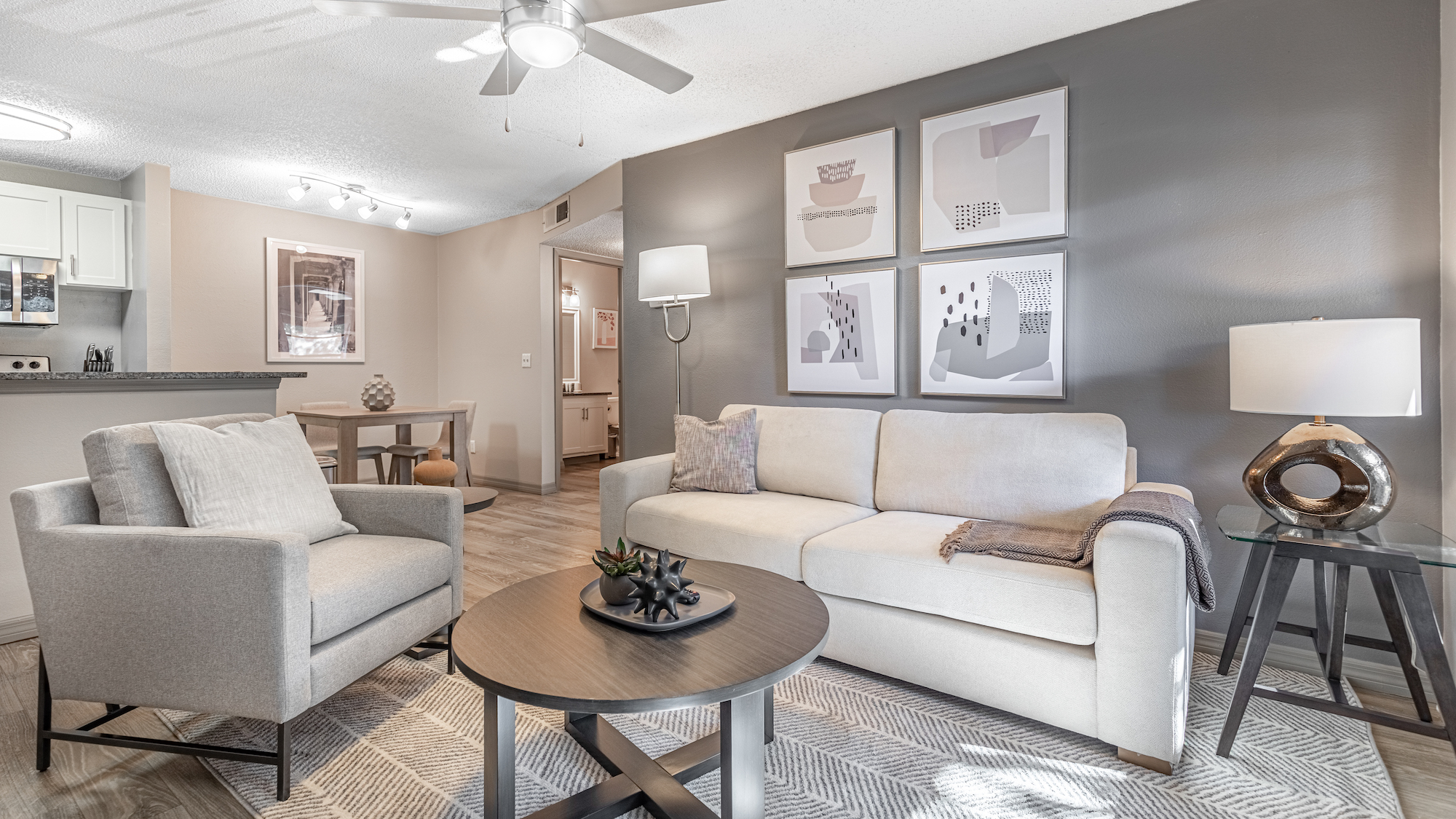
Leasing vs. Renting: What Are the Differences?

When you embark on a new apartment adventure, you’ll encounter options that offer leasing agreements and some that offer rental agreements. So, what is the difference between leasing and renting an apartment? To put it simply, rental agreements last shorter than six months, and leasing agreements can last up to 24 months.
Even if you know the difference, you might wonder what type of agreement is right for you. In this guide, you’ll learn everything you need to know about lease vs. rent agreements, including:
- The differences between leasing and renting
- The pros and cons of leasing an apartment
- The pros and cons of renting an apartment
The differences between leasing and renting
As we’ve already mentioned, the main difference between leasing vs. renting involves the duration of the rental agreement. However, both forms of agreement are established contracts between the tenant or renter and their landlord, helping to ensure both parties mutually agree on the rental terms or lease contract.
Both types of agreements require contracts with information and guidelines pertaining to:
- Name and contact information of the tenant
- Name and contact information of the landlord
- Length of contract (determining whether this is a rental or long-term lease agreement)
- Cost of rent payment, security deposit, and additional fees
- Responsibility for what utilities are to be used
- Additional fees (parking, pets, etc.)
- Right of entry
- Forbidden behaviors or activities on the property
- Damages or alterations made to the apartment
While leasing agreements and rental agreements often comprise the same stipulations, the terms cannot be used interchangeably, as they refer to different types of contracts.
Leasing agreements
A leasing agreement covers a living contract—be it in an apartment or home—for an extended period of time. This term can last anywhere from six months to 24 months, but the typical duration for a leasing agreement lasts for a year.
Leasing agreements do not automatically renew after each term, meaning you’ll need to make a lease renewal if you want to stay past the year-long term.
When you sign a leasing agreement, you enter a legal contract between yourself, the tenant, and the landlord. If you’re looking at leasing an apartment, it’s important to consider if you’re willing to stay in the same rental unit for up to a year.
For example, if you travel elsewhere for the summer or winter, or hop around throughout the year, it might be difficult to honor a full lease term. In this instance, you could circumvent this by subleasing—bringing on another individual to honor the lease term. However, subletting your rental property to someone can often come with its own risks and challenges, so think wisely before going with this option.
Rental agreements
Renting refers to a living agreement that is short-term—referring to any agreement that is less than six months. Typically, these agreements:
- Function on a month-to-month basis
- Automatically renew at the end of each term
In this arrangement, the landlord and tenant or renter can change the terms of the rent agreement (with proper notice) at the end of each month. You’ll be able to flexibly change your terms—or move to new arrangements—in a much shorter time than standard lease agreements.
To that end, with a short-term rental, you can find a furnished apartment where it’s warm for the winter and move north once the summer heat kicks in.
However, there are some aspects about renting you’ll want to consider, so take a look at the pros and cons of each agreement option below:
The pros and cons of leasing an apartment
While deciding to lease vs. rent, you’ll want to have all the facts at your disposal. Typically, the pros for leasing are related to the length of the leasing term. Longer terms come with more stability for living and financial situations. However, these same benefits can also be downsides depending on your lifestyle preferences. Here’s a breakdown of the pros and cons of leasing:
Pro: Stable living situation
When you sign a lease for a year or even two years, you’re locking into an agreement with the landlord. If you want to stay in the same area, neighborhood, or, more specifically, street for an extended period of time, the leasing agreement ensures you are legally bound to have your apartment until the leasing term is up.
In other words, your landlord cannot force you to vacate the property until the agreement is up, allowing you the security to live in a location where you might have an easier commute or be close to the amenities you enjoy.
Con: Less flexibility to move
While a yearlong lease can provide you with stability, it can also lock you into a particular neighborhood or city for a while longer than you might want to stay.
For example, if you take a new job in another city, suddenly your long-term lease can be a hindrance. Breaking leases is often difficult or costly, which means you might be paying two monthly rents until your old lease is up.
If you work remotely and like to live a more nomadic life, lease agreements might not be the right fit for you. The shortest terms on these agreements are up to six months, meaning you won’t be able to bounce around the country where the weather is best—or rent out a cottage in the woods for a seasonal respite.
Pro: Fixed monthly payment
Another benefit to signing a leasing agreement is that you’ll be able to lock into a consistent monthly payment for the full term. Monthly rent prices are constantly on the rise. However, under a long-term lease, you’ll have fixed-rate monthly expenses upon signing.
With this fixed-rate price, you’ll experience several budgetary bonuses:
- Stability: Your landlord won’t be able to raise your monthly payments on you during the lease term.
- Accuracy: You’ll be able to accurately budget for a year’s worth (or more) of expenses.
- Discounts: Some landlords offer a discount on monthly rates when signing longer leases because they offer landlords a stable source of revenue and reduce turnover expenses.
Con: Unable to cut back on costs
While leasing provides discount benefits, it may also come with financial burdens. Those with less consistent income will want to think twice about lease agreements if they’re concerned about budgetary constraints.
Imagine you’re a contractor under feast and famine cycles, and you hit a financial low. Suddenly, the lease agreement you budgeted for no longer fits your financial plan. In this instance, you’d be unable to back out of the agreement and would have to make your lease payments under financial strain.
The pros and cons of renting an apartment
Just like leasing, the pros and cons of rental agreements are based on the term of the agreement. Categorized as any term that’s less than six months, rental agreements—and their common month-to-month contract—provide flexibility above all else.
However, depending on the landlord or property, these flexibilities can have a few disadvantages along with their advantages:
Pro: Flexible end-terms
When you rent, you aren’t weighed down by longer fixed terms like leasing agreements. Your rental agreement will renew automatically so long as you and your landlord agree, allowing you to set the date when you’re ready to pick up and move.
This flexibility can provide you with the arrangement you need, especially if:
- You frequently move due to school, work, seasonal changes
- You need a short-term housing solution
- You aren’t looking to remain in one place for too long
- You work remotely and can explore different cities
- Your job requires you to travel to places for an extended stay
With a rental agreement, you can take advantage of the month-to-month flexibility, moving on to your next home whenever you see fit.
Con: Short notice to end the agreement
One of the risks with living in a rental agreement is the ability of the landlord to terminate the agreement at any time. Depending on where you’re located, your landlord might only be required to give you a one- or two-week notice before you need to move out.
Some states require 30 days’ notice, but even that can be difficult, especially if you need to find a new rental agreement. If you decide to stay in a rental agreement, you’ll want an arrangement you can trust—one that won’t throw you out in the cold on short notice.
Pro: Adaptable to financial needs
Say you suddenly get a raise and now can afford the neighborhood in the city you’ve always dreamed of living in. If you were under a fixed-term lease, you’d be confined to your current apartment and location until the term is up.
However, with a rental agreement, you’d be able to quickly hop out of your current agreement and into the community of your dreams. Rental agreements allow you to meet your financial needs month-to-month, allowing you to better suit your budget as prices rise or your salary changes.
Con: Fluctuating rent prices
Unlike lease agreements, renting an apartment means you don’t have a fixed rate under the agreement. This allows your landlord to adapt to the housing market changes faster. Suddenly, within the next month, your landlord can decide to raise your rent to reflect the demand for the area.
If you’re in an area on the rise, you might suddenly find yourself unable to fit the monthly rent required due to a rent increase. Additionally, if you cannot meet the landlord’s new rent prices, you’d have to give up your tenancy and find a new place to live.
Live on your terms with Landing
Whether you want a long-term lease that provides stability or a short-term rental agreement that gives you the flexibility you need, finding the right apartment can be tricky. But if a renting a new apartment sounds like the right fit, then find your next place with Landing.
When you join Landing, your membership connects you with thousands of apartments across the country, allowing you to browse furnished apartments that are ready to move in at a moment’s notice. Our effortless application process means you won’t get tangled up in paperwork, providing you with the ability to find your home in seconds. Say goodbye to strict leases and hello to flexibility with Landing.









